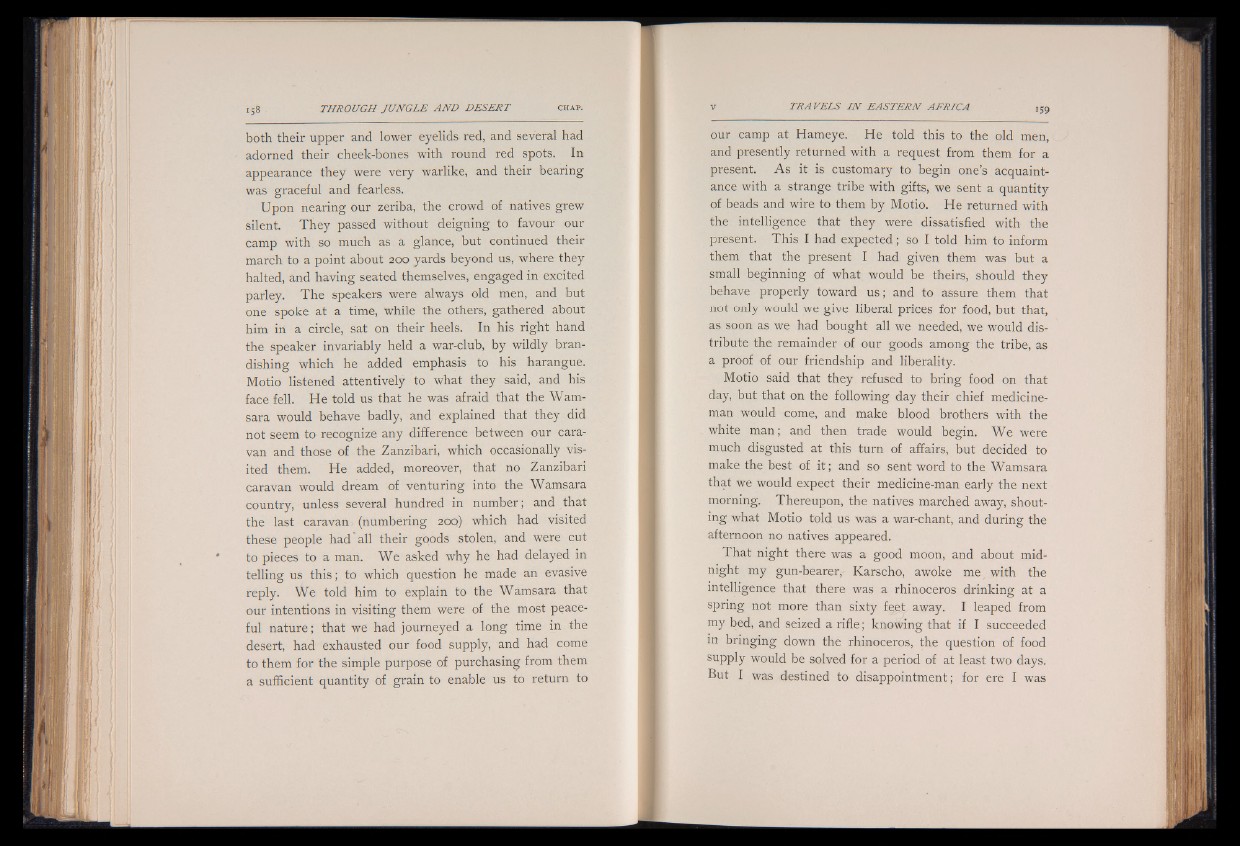
both their upper and lower eyelids red, and several had
adorned their cheek-bones with round red spots. In
appearance they were very warlike, and their bearing
was graceful and fearless.
Upon nearing our zeriba, the crowd of natives grew
silent. They passed without deigning to favour our
camp with so much as a glance, but continued their
march to a point about 200 yards beyond us, where they
halted, and having seated themselves, engaged in excited
parley. The speakers were always old men, and but
one spoke at a time, while the others, gathered about
him in a circle, sat on their heels. In his right hand
the speaker invariably held a war-club, by wildly brandishing
which he added emphasis to his harangue.
Motio listened attentively to what they said, and his
face fell. He told us that he was afraid that the Wam-
sara would behave badly, and explained that they did
not seem to recognize any difference between our caravan
and those of the Zanzibari, which occasionally visited
them. He added, moreover, that no Zanzibari
caravan would dream of venturing into the Wamsara
country, unless several hundred in number; and that
the last caravan , (numbering 200) which had visited
these people had all their goods stolen, and were cut
to pieces to a man. We asked why he had delayed in
telling us this; to which question he made an evasive
reply. We told him to explain to the Wamsara that
our intentions in visiting them were of the most peaceful
nature; that we had journeyed a long time in the
desert, had exhausted our food supply, and had come
to them for the simple purpose of purchasing from them
a sufficient quantity of grain to enable us to return to
our camp at Hameye. He told this to the old men,
and presently returned with a request from them for a
present. As it is customary to begin one’s acquaintance
with a strange tribe with gifts, we sent a quantity
of beads and wire to them by Motio. He returned with
the intelligence that they were dissatisfied with the
present. This I had expected ; so I told him to inform
them that the present I had given them was but a
small beginning of what would be theirs, should they
behave properly toward us; and to assure them that
not only would we give liberal prices for food, but that,
as soon as we had bought all we needed, we would distribute
the remainder of our goods among the tribe, as
a proof of our friendship and liberality.
Motio said that they refused to bring food on that
day, but that on the following day their chief medicineman
would come, and make blood brothers with the
white man; and then trade would begin. We were
much disgusted at this turn of affairs, but decided to
make the best of it; and so sent word to the Wamsara
that we would expect their medicine-man early the next
morning. Thereupon, the natives marched away, shouting
what Motio told us was a war-chant, and during the
afternoon no natives appeared.
That night there was a good moon, and about midnight
my gun-bearer, Karscho, awoke me with the
intelligence that there was a rhinoceros drinking at a
spring not more than sixty feet away. I leaped from
my bed, and seized a rifle; knowing that if I succeeded
in bringing down the rhinoceros, the question of food
supply would be solved for a period of at least two days.
But I was destined to disappointment; for ere I was